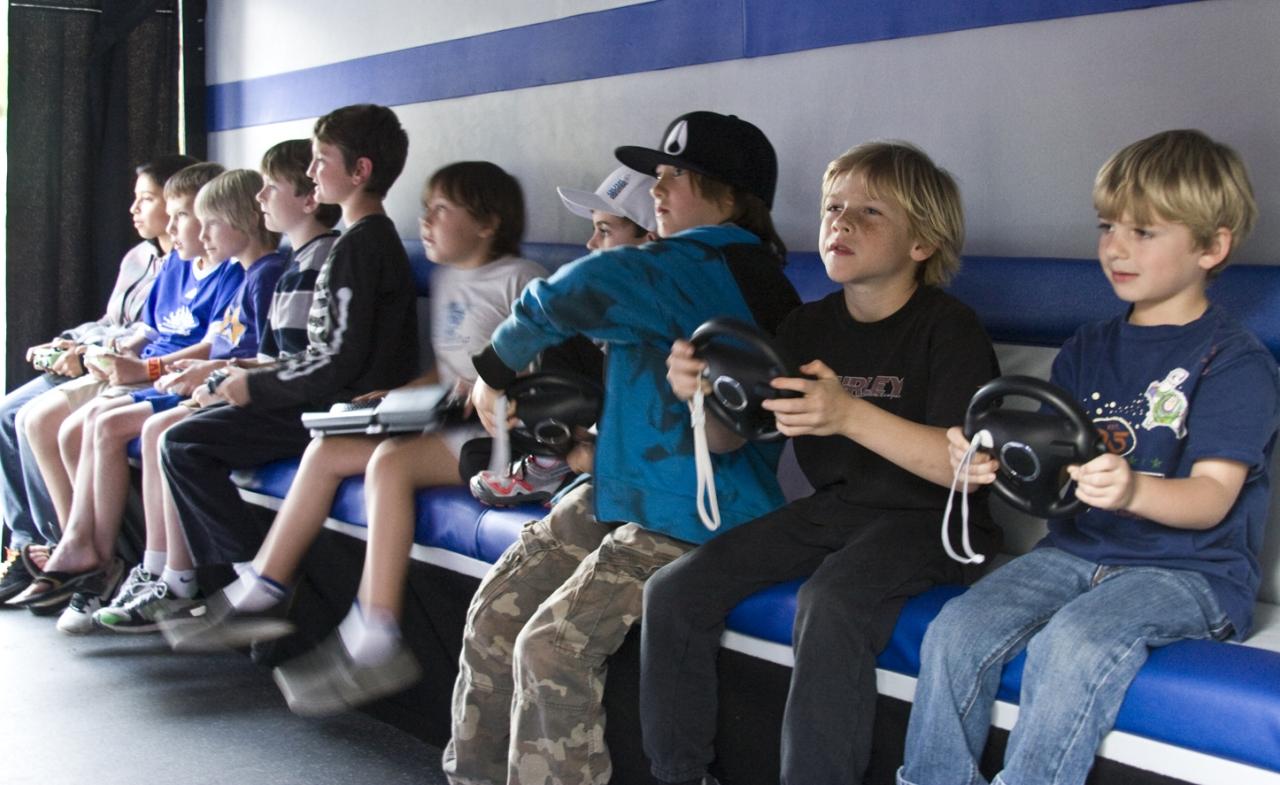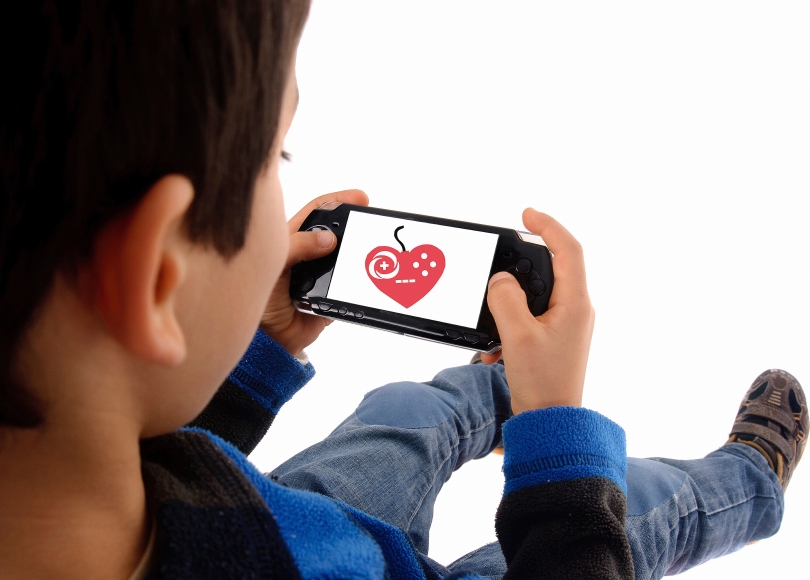Welcome to Part Two of our mini-series on the effect of violence in video games on children. For Part One, click here.
Last time, we spoke briefly about the differences between violence and aggression, as well as discussed how correlation between events does not imply causation of one event/behavior because of another. After examining some of the available research, we concluded that, while violent video games cause increased aggression in adults, video games did not cause increased violence. I then posed the following questions:
- Can video games cause permanent changes to aggression in children?
- Do video games cause children to become violent people?
- What effect can exposure to media violence have on childhood development?
- What might be different about video games than other media? Is there a difference?
So without further ado, let’s jump in to part two and examine how violent video games may affect levels of aggression and violence in children
Something Old
A brief recap of definitions:
Correlation – Correlation is when two events happen at the same time, but could both be caused by a third event (which might have been unaccounted for). The example I used is that both ice cream intake and instances of drowning both go up at the same time; they are correlated. But eating ice cream doesn’t cause drowning, and drowning doesn’t cause ice cream eating. Rather, these are both effected by the weather; that is, they both happen in summer.
Causation – Causation implies that one event directly influences – or causes – another, every time it’s present (or almost every time). As an example, prolonged exposure to loud sounds is one cause of hearing loss; almost everyone will experience hearing loss if exposed to prolonged loud sounds.
Aggression – Aggression is an umbrella term for any non-physical act that is performed with the intent to harm or irritate someone else. Spreading rumors, yelling at someone, belittling someone, insulting them, and purposefully misplacing something so a person looks bad are all examples of aggression.
Violence – Violence is a form of aggression; it is physical aggression. Punching someone, throwing objects, or causing other bodily harm (e.g., playing loud sounds for a prolonged time with the intent of causing hearing loss) are all acts of violence.
Something New
Another that we’ll be talking about:
Desensitization – Desensitization is a decreased emotional response to an adverse, negative, or even positive event/stimulus, after repeated or prolonged exposure to that stimulus.
This dampened response can occur either through real-life overexposure (e.g., climbing a lot of ladders over and over again will eventually cure you of a fear of heights) or “vicariously,” such as through overexposure through media or other observation. This is the type of desensitization we often hear about in relation to violence in video games.
Learning Theory
Without getting too technical, we learn by responding to incoming information in different ways. Based on new information, we may change our behaviors, how we think about something, and construct our understanding of the world. So what we learn is incredibly important. In regards to video games, there are theories that discuss both short-term* and long-term learning. Here, we’ll be talking more about the long-term effects of the type of learning that may occur during a game, especially with how that relates to children.

There are two main steps, if you will, to solidify thinking and behavior patterns, and these steps are linked by a third condition that we’ll talk about in a minute.
First, the child must be exposed to a stimulus. This is called observational learning, and young children, school-age children, and even pre-teens or teenagers develop schema for their behaviors based on what they see around them. Think “monkey see, monkey do.” We learn from and mimic the behaviors we see around us. As children age, these schema become solidified and harder to change.
A second process is desensitization, which we defined above. This repeated exposure to a highly emotional or psychologically stressful stimulus results in the brain trying to “cope” with the extended levels of stress by deciding the stimuli is not important/emotional/stressful. Thus, this once-stressful event becomes commonplace.

However, these two processes don’t simply happen in a vacuum. The above two conditioned behaviors (the learned behavior and the desensitization of a stimulus) must be used, practiced, and reinforced in order to solidify the “new” information as a normal way of thinking or acting.
Unfortunately, it only takes a small number of exposures to start the learning process, especially in childhood, when children are just beginning to build their “behavior models” that they will use for the rest of their life. Regardless of how the information is learned, these behaviors will influence how they live; in other words, reactions and behaviors learned from video games can be generalized to other areas of their lives (meaning that players won’t simply stop thinking in aggressive or violent ways just because the game turned off).

It is important to remember that without exposure to other ways of thinking, these behaviors and ways of thinking become solidified and hard to change (i.e., part of your personality).
Not In Front of the Kids!
Video games, as I alluded to in Part I, have a unique position for learning behavior, as players must actively participate in the game for the story to progress. We don’t simply observe a character kiss another, shoot a bad guy, or pick flowers. We enact it. Even though our actions are conveyed via a tool (i.e., the controller), our brains don’t differentiate between tool usage vs. not when it comes to determining “who” caused an effect*.

Now, to be fair, research shows that there is no single risk factor that directly results in a person acting aggressively or violently. But the accumulation of “risk factors” can permanently change how a child develops, and not for the better.
Make no mistake, all media violence is harmful to children, and it does change what they learn and how they behave, especially if there is no adult to offer alternative ideas, ways of thinking, or even simply commentary/disapproval of the violence on the screen.
I cannot stress enough the importance of an adult being involved in their children’s media consumption. By talking to the child, an adult may offer perspective, or, through their comments, may simply result in the child saying something akin to “It’s just a game, Mom and/or Dad. I know that’s not how you act in real life” (complete with eye roll).

But even the child’s own comments reinforces to the child that aggression or violence isn’t okay, and so that will not necessarily become a main component of their behaviors. And research has shown that children, and even teenagers, will assign higher importance to what they see at home compared to what they see on television. After all, real, physical, personal experiences will trump anything that takes place behind a screen.
But there’s more.
Do violent video games CAUSE violence or aggression in children?
As I mentioned, there is no conclusive evidence that shows, clearly, that video games cause children to be violent.
However, longitudinal studies** have shown that, when exposed to media violence, children will grow to be more aggressive adults, compared to children who were exposed to less media violence. Interestingly, gender does not appear to have an effect on how aggressive the child will become, nor does their “trait” levels of aggressiveness. With personality and gender taken into account, we can say with some degree of certainty that violence in video games does cause increased aggression.
So, yes. Violent video games cause higher levels of aggression in children.

…but only because depictions of violence in media causes higher levels of aggression.
** Longitudinal studies are research studies that follow the same group of participants over a long period of time.
Where’s the Violence?
To muddy the waters further, it’s not just video game violence that can have an adverse affect on children. It’s also violence in other media, as well as how that violence is depicted. For instance, superheroes often act violently toward bad guys. So what?
Well, in those cases, violence is being seen as justified, which reinforces the idea that violence is, in fact, sometimes the answer. And if the “good guys” can act violently, that provides an example to the children who idolize them.

And it’s everywhere. The Powerpuff Girls, Spongebob Squarepants, literally any superhero show or movie… While by themselves these are not bad, and a little exposure to violence won’t turn a child into a delinquent, the accumulation of “observed violence” absolutely is.
So why video games? If all media has an impact, and if that impact has been studied, why are video games the sacrificial lamb of the media community? I would hypothesize it’s because of their interactive nature, like we talked about above. Not only does a person have an active hand in causing various types of mayhem, but for the people who are more prone toward violence, video games can act as a “training ground.”

After all, we all know that headshots get you the most points and make the bad guys fall faster, don’t we?
And without any other information to counter what we’re doing on-screen, we’re reinforced with intrinsic rewards (things that happen in your own head), as well as extrinsic rewards (like the points).
It feels good when we line up that perfect hit, doesn’t it? We feel a little rush of relief, or pride, or another positive emotion, when we watch our enemy fall down, dead.
But it’s just a game, so it doesn’t matter.
…Right?
Conclusion and Questions
This is another article with a lot of information in it (and I even had to cut a lot* just to keep things as streamlined as possible). But what’s the answer? Next time, I’ll be posting a bit of a thought experiment about how we, as a community, can move forward with this information in order address these very real concerns while maintaining the integrity of our medium. Join me next time for thoughts on:
- Imposed regulation (via the government and/or another entity)
- Ratings systems
- Parental involvement
- Mental health issues
- …and more.
What are your thoughts on the “violence quotient” I talked about? How big of a role do/should parents play in their children’s media habits? Should we be worried about allowing children to act out violent scenarios?
Let me know in the comments!
Thanks for stopping by, and I’ll see you for Part III soon!
~ Athena
**This article has some extra content available over at Patreon, if you are so inclined!**
What’s next? You can like, subscribe, and support if you like what you’ve seen!
– Support us on Patreon become a revered Aegis of AmbiGaming, and access extra content!
– Say hello on Facebook, Twitter, and even Google+!
– Check out our Let’s Plays if you’re really adventurous!
References:
American Psychological Association. (2015). Resolution on Violent Video Games. Retrieved from: http://www.apa.org/about/policy/violent-video-games.aspx
American Psyhological Association. (2015). APA review confirms link between playing violent video games and aggression. Retrieved from: http://www.apa.org/news/press/releases/2015/08/violent-video-games.aspx
Anderson, C.A., & Dill, K.E. (2000). Video games and aggressive thoughts, feelings, and behaviors i the laboratory and in life. Journal of Personality and Social Psychology, 78(4), 772-779.
APA Task Force on Violent Media. (2015). Technical report on the review of the violent video game literature. Retrieved from http://www.apa.org/pi/families/violent-media.aspx
Bushman, B.J., & Huesmann, L.R. (2006). Short-term and long-term effects of violent media on aggression in children and adults. Arch Pediatr Adolesc Medd, 160, 348-352.
Hasan, Y., Begue, L., Scharkow, M., & Bushman, B.J. (2012). The more you play, the more aggressive you become: A long-term experimental study of cumulative violent video game effects on hostile expectations and aggressive behavior. Journal of Experimental Social Psychology, 49, 224-227.
Huesmann, L.R. (2007). The impact of media violence: Scientific theory and research. Journal of Adolescent Health, 41(6 Suppl 1), S6-13.
Mitterschiffthaler, M.T., Yu, C.H.Y., Dalton, J.A., Andrew, C.M., & Williams, S.C.R. (2007). A functional fMRI study of happy and sad affective states induced by classical music. Human Brain Mapping, 28, 1150-1162.


I’m glad you reached this conclusion! As a parent, the extreme elements in modern gaming particularly concern me and I want to be careful about what my young children see and take in. There’s a big “for now” there, since they’ve got to grow up eventually and see everything for themselves. The role of parents in (shockingly) parenting their child shouldn’t be something new or novel or something which requires research to establish, but I’m sincerely glad that it does. It’s a reminder to me of the solemnity, the sacredness, and the importance of the role of parent in my children’s lives. This is exactly how the rating system should work and commentary should be a significant part of introducing and framing these most extreme concepts to the young, burgeoning mind. “Just a game” or “just a movie” seem like oft used phrases by parents that are more indifferent and even uncaring than concerned, and shouldn’t parents care about the development of their children? Thanks for the read! It was a nice change of pace for me personally to read something as well-researched as this.
LikeLiked by 4 people
““Just a game” or “just a movie” seem like oft used phrases by parents that are more indifferent and even uncaring than concerned, and shouldn’t parents care about the development of their children?’
You’d think that they should but just anecdotally through my wife’s experiences as an educator, there are so many that don’t care about their children at all.
LikeLiked by 2 people
This isn’t quite the same thing but (also anecdotally) I’ve taught high school youth groups for almost a decade and it’s pretty shocking how little some parents seem to care about what their kids do with their intellects. There is some kind of disconnect in some parents who think their kids are “good kids” and therefore do everything right so they stop providing them guidance and aid in understanding the world or even passing down their values. I’ve known a lot of kids who grew up to reject their parents for that.
LikeLiked by 2 people
Yeah, I think the ‘for now’ aspect is a pretty big one. Both general understanding and a specific ability to separate fiction from reality grow as one ages, hence why what’s appropriate, or what would lead to more violence for a young child, wouldn’t have such an effect on a pre-teen. So ideally, once the kids do get old enough to check out a bit of everything, they should be better equipped to process it without adverse impact.
I do wonder if there’s a limit to how much desensitization media can have in the average person however. I’ve known people who grew up with plenty of violent games, and although there’s a pretty big mix as to how well-adjusted they are, they all still seem to react pretty negatively to shock images, far as I can tell.
LikeLiked by 2 people
That would definitely be ideal, yes. I’d say that’s part of becoming a well-adjusted adult, so that would be great if teenagers/older children were able to start processing things by themselves with less parental input (not *no* input, because they’re learning, but you know what I mean).
I’d be interested in this, too, but as of yet I haven’t found any literature on a desensitization limit. If I could run a study, I would want to complete a full personality inventory, and interview parents, before tracking game time and eventual “violence” measurements. I played a fair share of violent games, as well, but that doesn’t mean I don’t react seeing a gory picture or anything like that. I’d wonder, also, if things like saying “I hate him and want to kill him” are considered “aggression,” even if the person would never actually hurt anyone, simply because they picked up that manner of speaking from wherever. Hm…
LikeLiked by 1 person
Thanks for your comment! There are definitely a lot of complexities when it comes to home life, as well, and I’ll try to touch on them in part 3, but you’re right that parents do need to be involved and stay involved in their children’s lives (duh) and media habits (also duh).
Another thing to consider is really having a clear and understandable rating system, and then educating non-gamers as to what it means (this might happen as video games are advertised on television again), so hopefully that would counteract the “just a ___” nonsense we hear sometimes.
Thank you! This is a complicated issue with a lot of inflamed feelings on both sides, so I’m glad I could provide an article backed by research and (hopefully) a little more moderate.
LikeLiked by 1 person
Moderate and necessary for that reason!
LikeLiked by 1 person
“How big of a role do/should parents play in their children’s media habits?”
As a parent, I believe that I should play a major role in the media consumption of my children. Each kid is so different so gauging what is and isn’t appropriate for them is a learning experience.
“Should we be worried about allowing children to act out violent scenarios?”
That is a tough question to answer. I mean, I remember as a kid playing Army or Star Wars with the neighborhood kids and we ran around shooting each other with toy guns. How different is that from my kids running around in Ovewatch shooting their friends or other players – other than they are inside? But then is that a far stretch from Overwatch to say Wolfenstein, a game I wouldn’t allow my son to play. It is a tough call but funny thing is, parenting is tough and requires work.
“If all media has an impact, and if that impact has been studied, why are video games the sacrificial lamb of the media community?”
I agree with your hypothesis, the interactive nature of games certainly give them a higher profile. I’d add though that there is an air of ignorance around those that make it an issue on the political front. When I remember this first flaring up it was the early/mid-90s (Mortal Kombat era) most of the politicians or political pundits didn’t play games at that time. They understood TV and movies, they didn’t understand games and because of that ignorance, games became the easy target. While I think it has gotten somewhat better over the past 20-25 years (God, now I feel real old), I still think there is a level of ignorance about technology and games in general that colors them as the easy target.
Anyway, I’m looking to part III.
LikeLiked by 2 people
Thanks for your comment! I’m glad to see there are some parents weighing in here 🙂 Parenting is hard, so I think the other part of “being a good parent” is having information available that is both understandable and easily applicable, which is the responsibility of the community a little, too.
Ignorance (of both sides of the issue) has definitely put us into the pickle that we’re in today, and so I would agree that – as always – things are getting better, but there is still a lot of improvement that could happen, both in the home and in the industry.
Thanks! Looking forward to seeing you back!
LikeLiked by 1 person
Yeah, echoing what everybody else has said, I think it’s always important to remember two things.
Firstly, when the “video games cause violence” chestnut gets dragged up, it’s always just that – not *some* games, or *violent* games, or *18+* games – and it’s a subtly different way of framing the issue that has profound consequences. Many films are violent, but you never hear “do *films* cause violence” type questions precisely because it’s a ludicrously broad category, and whilst Saw, or The Human Centipede probably wouldn’t do your kids any favours if they watched them, Toy Story’s a whole different, erm, story. For sure, many games do involve some form of killing, or “violence” in order to progress, but not necessarily, and in many, it’s no more violent than your average Tom and Jerry cartoon. By using just “Video Games” constantly, and without narrowing down the categories, there’s been a distinct element of tarring all games – an entire medium – with a one-sided brush.
Secondly, relating to that – and as actual parents have pointed out above – some games aren’t for kids, and it’s absolutely a parent’s responsibility to filter what their kids are exposed to. Again, even if Gaming’s interactivity is a factor, and if the desensitising thing’s an issue, it’s an issue in much the same way it is with other media, and yet Gaming seems to be subject to the whole “won’t somebody pleeeeeeease think of the children….” thing more than any other form of entertainment. Yeah, kids *could* play ultraviolet games that have an unhealthy impact on their behaviour or development, but they can also watch Saw or The Human Centipede^ too, and it’s a parent’s job to make sure they don’t.
^Film actually went through this when VCRs first came out, and there was a huge moral panic because kids *could* watch “video nasties”. It lasted all of about 5 minutes though, and everybody realised how stupid it was to denigrate *all* videos because some kids *might* watch one or two of the bad ones. Yet with “Video Games” that exact mentality still seems to be a thing three decades later.
LikeLiked by 3 people
You’re right that there is no descriptor of *violent* video games causing violence, but rather the ubiquitous “video games.” And that’s part of the battle, isn’t it?
Parents have a tough job, for sure, and there’s so much information out there, so it’s partly them being involved, and partly our responsibility to make sure information is available for them to understand and apply as needed. Everyone understands film rating systems, and anyone with half a brain can figure out the types of books that are appropriate for chidren, but video games are “just games” and their content dismissed just as easily. Ugh.
Anyway, thanks for your thoughts!! We’ll be diving into all this and fitting the pieces together in part three!
LikeLiked by 1 person
It really is such a complex issue, isn’t it? Looking back on it, I was exposed to a lot of things at a young age, ranging from violent games such as Mortal Kombat to films such as Nightmare on Elm Street and Better Tomorrow. Barring the years I spent wrestling though, I’ve never been a violent person in everyday life. I think that a lot of that was due to my parents reinforcing the difference between fact and fiction. As a parent myself now, I tend to be a lit stricter with regards to age ratings. If nothing else, while I do believe that every child is different in terms of what they can handle at each age, the reasons ARE there for good reason. It can be a major worry when you see what some parents show their kids now.
LikeLiked by 2 people
The family aspect is an important one. After all, parents are the ones who provide the structure for their children’s lives, and without that, children will find the structure anywhere they can find it. One of those “structures” is clearly defining the difference between make-believe and reality, in all aspects of those terms.
There is a lot of information for parents to take in in regards to media, so part of the issue is also unclear rating and a lack of education as to what the ratings are and why they are there. You’re right that each child is different, so it’s absolutely up to those parents to make an informed decision. But then we as a community need to make sure that the information is there and easily understandable, as well.
And I’m not a parent, and it is *definitely* worrisome when I see some things that parents allow their children to watch and/or play…
LikeLiked by 1 person
Nice to see such a well-researched article! I’ll keep this short but I think there’s a big difference in emotional impact in two scenarios: impact in a loving home + violent videogames and a neglectful home + violent videogames. Once anger towards human beings is let out via violence, like a child who deals with abuse and is “left to find solace in violent videogames,” I think you can nurture a tendency to resolve issues with violence.
I grew up playing some violent games but never had a problem with aggression. Same with my little cousins these days. Totally normal kids who can separate fact from fiction.
Now take a child who grew up being ignored and videogames were the only comfort – those bitter feelings towards his or her parents could turn to anger and eventually into violence.
I guess what my overall point is, it’s the atmosphere that the child experiences violence in. And at the end of the day, that’s up to the parents. The aggression would be there with or without videogames, but games are always an easy target because everyone loves movies, but not everyone plays videogames.
LikeLiked by 2 people
Thank you 🙂
Same here! I played violent video games, but my parents were not only involved in my life (and my video game hobby), but they’d also offer their opinions if things got a little out of hand in the game, ensuring I knew the difference between acting in a game and acting in real life. Your absolutely right that home life is a major factor!
There is also something to be said for violent video games as a stress relief, as they give players a safe place *to be* aggressive and violent and not actually hurt anyone, so in that regard they can be a powerful tool for coping, as well. I’d also agree that video games are a soft target within the realm of media…
Those are really great points you’ve made; thanks for your thoughtful comment 🙂
LikeLiked by 1 person
Why video games? It’s simple. First it was music and dancing that was the devil, then movies and tv, now it’s video games. It’s only still lingering on video games because there hasn’t been any other massive new media form introduced since. Someday in the future when actual virtual reality with direct neural interface hits the streets, that’ll be the new scapegoat for the next generation to use to justify not raising their own children.
LikeLiked by 1 person
Media plays a large part of our lives, so I think a little wariness regarding how the latest “gadget” will affect people is warranted, but at this point I think we all – parents, players, and game community – need to start problem solving a little more realistically than we have been. There are a lot of hurt feelings on both sides, I think, and that needs to be overcome.
I do agree that media is often used incorrectly to placate children, or used as a babysitter, but even that is a difficult and complex situation. I’ll be trying to touch on that in part 3, but at the end of the day it’s going to take a lot of talks, discussions, and open-mindedness to move forward. Your’e right that this is a pattern we’ve seen, and so we need to take steps to ensure that we *keep* following the pattern to acceptance.
For instance, as someone else commented, VCRs were feared because of the “bad videos” kids could now access, but that drama was quickly ended, even before the release of things like DVDs, so I think it’s possible to move forward without simply having to shift blame (at least I hope so!).
LikeLike
It must be pretty difficult even if you try to monitor everything too. I know when I was a kid, whenever a parent said “that’s not for you” it just made me get more creative in finding workarounds. Stay up late and sneak around to tape bad movies on cable or borrow my dad’s work laptop to get on the internet and so on.
LikeLiked by 1 person
Of course! Kids won’t ever exist in a bubble, and some kids will push back against rules more than others. So I think it’s important for parents to be involved and educate their kids when they have the chance/they are spending time with their child and their media.
LikeLike
I don’t want to sound pear-clutchy, and I am sure being a parent is not an easy thing to do, but I’ve often pondered if access to personal devices has become a barrier for parents and children to discuss media. I used to teach 7th grade (so 11/12 year-olds) and sometimes I would ask the kids things about what they had been reading or doing with their free time. I was surprised to learn a considerable amount of them watched Game of Thrones, read The Walking Dead or played Assassin’s Creed. Some did these things with their parents’ knowledge, but most didn’t because they had their own computers or tablets.
So, I cannot stress how important I think parental involvement is. With that said, I don’t think it boils down to just that, because the gaming community and developers could stand to be a smidge more responsible about what kids see.
LikeLiked by 2 people
I agree that, in some homes, there is a certain laissez-faire around parenting. And there are a lot of factors that contribute to that, including the monitoring of personal devices, but also including the fact that parents are so much busier nowadays. And that opens up an entirely different can of worms.
At my house, we were monitored for what we watched and played (not creepily so, but the television and the computer were in common areas, and we were *not* allowed to have either in our rooms. Period.) Parental involvement is important for any media consumption, books and music included. Media plays a HUGE role in all of our lives, so why shouldn’t parents be more involved in how their children interact with it?
But yes, the gaming community has its own blame, too, and could be more responsible, and I’ll be getting into that more so as to ruffle all the feathers I can 😉
LikeLike
That is very true about parents being busier than ever. And I am afraid I sounded like I placed too much of the blame on parents, when they have to pay attention to so many more things than previous generations. They have to keep an eye on their Netflix account activity, who is on their kid’s social networks, cyber-bullying, if the youtubers the kids watch aren’t nazis or humiliating people for “social experiments”, etc. I truly do not envy them.
Perhaps part of the problem is that gaming is still seen as a niche activity, so questionable attitudes or content get a pass. It may not be as bad as 20 or so years ago, but every now and then you hear things like that the Beyond Two Souls controversy or the yearly embarrassment that are the VGAs/VGXs, and it becomes apparent there we have a metric crapton of problems (not to mention more serious matters like GG).
Oof, sorry for the rant. I look forwards to the feather-ruffling conclusion. 🙂
LikeLiked by 1 person
Not at all! There’s certainly reason for everyone to take a little responsibility, even amidst the confusion! Your’e right though. Parents have a lot more media devices to monitor than when we all were children…
I’d agree with video games being seen as a niche activity, and so hardly worth being educated about. Nevermind that games really are so prolific now that this is just completely silly, but yes, I think that feeling sometimes keeps folks from really analyzing games the way other media is analyzed.
We certainly do have our share of problems, don’t we? And rant away! Looking forward to seeing you for the action-packed conclusion! 🙂
LikeLike
Don’t you touch my pears!
LikeLiked by 1 person
Oh. *facepalm*
LikeLiked by 2 people
Not going to lie, I Googled “pear clutching” because I thought I was missing out on some hip new expression. But I like this. I’m going to use “pear clutching” whenever I can, now!
LikeLike
Pear-clutching is all the rage now. Yep. That’s totally what I meant. 😉
LikeLiked by 1 person
Reblogged this on DDOCentral.
LikeLiked by 1 person
Thanks! I appreciate it 🙂
LikeLike
I abhor the “just a game/movie/story” mindset, because media does affect us. The stories/scenarios aren’t real, but our emotions about them definitely are.
I’m really looking forward to your views on nature vs. nurture since I think that’s also a major factor in this debate aka the “I was exposed to violent stuff and I turned out fine!” which is another thing. What we consider “fine,” is another arbitrary factor.
I love this miniseries!
LikeLiked by 1 person
You’re right. That’s one of the reasons any sort of storytelling is so powerful. While the words might be fictional, our reaction are real and the things we learn are real, as well.
Part 3 is definitely going to be a doozy! Personality, nature/nurture, parenting, and industry protocol are huge topics by themselves, and they all come together and interact with one another when it comes to what a player is exposed to and takes away from a gaming experience!
I like that idea that what we consider “fine” is arbitrary. Hm… And I’m glad you’re liking the miniseries 🙂
LikeLiked by 1 person
Again, awesome article! This has been a very interesting series. I think you, as a gamer, have done a very good job of examining this rather touchy subject with objectivity. It’s easy to want to dismiss any claims that video games can be bad out of a desire to defend our hobby. But we have to acknowledge that without parental guidance, media consumption really can be harmful to their development. Once my son is old enough for games I definitely want to be there right with him and understand what he’s playing so I can help him form healthy thoughts about the content he is taking in.
LikeLiked by 1 person
Thank you for your kind words. You’re right that it’s so easy to dismiss ideas that are inconvenient, but that always creates more problems, no matter the circumstances.
It makes me very happy to hear that you and other parents (at least the ones who visit this site) recognize that they do play a role in their children’s media habits; I know I never felt stifled by my parents’ involvement, especially when it was presented as taking an interest in something I enjoyed to do.
LikeLiked by 1 person
That’s great that your parents were involved and took an interest! My mom was really great at that as well. Even though she is not a gamer she always asked about what I was playing and we’d talk about the stories and such. I always appreciated that support, so I definitely want to bond with my own child over games!
LikeLiked by 1 person
definitely agree that a child playing a violent video game without a parent or overhead figure around to just point out “hey! ripping that guys arms off is BAAAD!” probably really helps. I for one am was a child who played Mortal Kombat 2 to death back on the snes. I was a mere 5-6 years old probably. It was gory, violent, absurd, as i said, you could literally rip a guys arms off as a finishing move and see blood squirt out. But my parents luckily were involved with what i played and maybe my mom didn’t play MK2 with me, but she enforced me not being allowed to do fatalities. My dad on the other hand actually played with me, so through this, i understood how different and violent this game was from others and knew you just don’t do these things in the real world. I’m not saying without this, i’d go electrocuting people or pulling off my mask to unveil my skull to incinerate my enemies on the streets, but it helps i’m sure. If i ever had a question, i could turn to them.
It’s how I plan to have my kids game, if they want to play a violent game, i won’t say no, but chances are i’ll know what it entails and if it’s something i think needs supervision, i’ll make sure they only play while i’m around.
LikeLiked by 1 person
Moderation in all things! It seems like you and I had similar childhood experiences, and look at us not being all scary skull-headed murderers 😉
Providing perspective and a counterbalance to the violence on the screen (or in the music, or on the pages of a book) is such an important component, especially when it comes from a parent or parent-figure. Children need that perspective, because they don’t come ready-made with it, after all! So if all the input they get is media, then *those* are the parameters they use to learn their behaviors.
Knowing what your children can handle is also important, because each child is different,too. I approve of your plan, and would probably implement a similar one if I was a parent!
LikeLiked by 1 person
Thank you for tackling this subject and fostering conversation that is both open and encouraging. Educating everyone, especially helping parents with resources and the like, is key in developing responsible media use.
LikeLiked by 1 person
Glad you liked the article! With so many different ideas and hurt feelings, I tried to take a more moderate and objective look at the issue; it’s a real concern, and not one that will be solved by simply preaching at people (on either side).
You’re right that having resources is important. With the internet, it can be so easy to be misinformed, or to not even know where to start. There’s a lot I’m going to try and touch on in the next part, so I’ll try to touch on this, too! 🙂
LikeLiked by 1 person